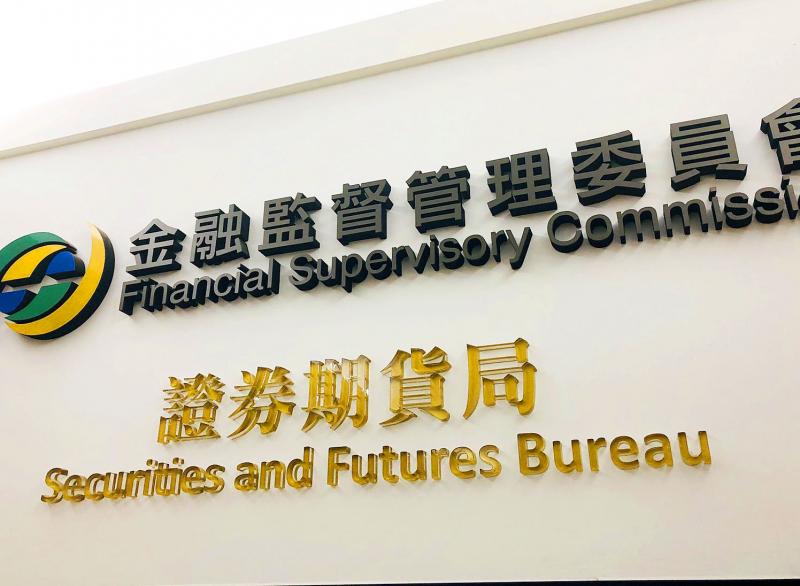The Financial Supervisory Commission (FSC) yesterday enhanced disclosure requirements for environmental, social and governance (ESG)-themed funds to prevent “greenwashing” in the asset management sector.
The commission has requested that asset management firms set at least one sustainability goal for each of their ESG-themed funds and explain how their investment would help achieve that goal, Securities and Futures Bureau Deputy Director Kuo Chia-chun (郭佳君) told a videoconference in Taipei.
Companies operating 21 ESG-themed funds that have been launched, or five funds that have been approved, but have not been launched, must disclose the information in the next six months, or the funds would not be officially recognized as ESG funds, Kuo said.

Photo: Kelson Wang, Taipei Times
“In Taiwan, more securities investment and consulting firms have been offering products whose largest selling point is sustainable investment, but we noticed that many failed to provide sufficient information as to how their funds address sustainability issues,” Kuo said.
The firms should set at least one sustainability goal, and each goal should tackle environmental, social and governance issues at the same time, she said.
Once the firms set their goals, they need to ensure that 60 percent of the money under management is allocated for investment in companies whose operations are in line with their goals, Kuo said, adding that 70 percent would be a better ratio.
For example, if an ESG fund focuses on energy transition, the fund’s portfolio should include companies operating in green energy, electric vehicles or other renewable energy technology, Kuo said.
The commission would not intervene in or regulate the sustainability goals that can be set by asset management firms, she said.
However, it urges asset management firms to refer to the Paris Climate Agreement or the UN’s Sustainable Development Goals, such as gender equality, affordable and clean energy, clean water and industry innovation, Kuo said.
Asked if firms need to target net-zero carbon emissions like some financial conglomerates, Kuo said that it would be an ambitious goal, as asset management firms targeting net-zero emissions must convince the commission that the companies their funds invest in have net-zero carbon emissions.
If a recipient of an ESG fund were to be embroiled in a corporate scandal, the asset management firm supplying the fund would not be asked to withdraw its investment, she said.
However, it must review the attribution of the scandal, the date when the alleged malpractice took place and whether the company invested in has resolved its governance issues, Kuo said.
The commission referred to tightened regulations released last month by the Hong Kong Securities and Futures Commission, and the Sustainable Finance Disclosure Regulations released by the EU in March.

Stephen Garrett, a 27-year-old graduate student, always thought he would study in China, but first the country’s restrictive COVID-19 policies made it nearly impossible and now he has other concerns. The cost is one deterrent, but Garrett is more worried about restrictions on academic freedom and the personal risk of being stranded in China. He is not alone. Only about 700 American students are studying at Chinese universities, down from a peak of nearly 25,000 a decade ago, while there are nearly 300,000 Chinese students at US schools. Some young Americans are discouraged from investing their time in China by what they see

MAJOR DROP: CEO Tim Cook, who is visiting Hanoi, pledged the firm was committed to Vietnam after its smartphone shipments declined 9.6% annually in the first quarter Apple Inc yesterday said it would increase spending on suppliers in Vietnam, a key production hub, as CEO Tim Cook arrived in the country for a two-day visit. The iPhone maker announced the news in a statement on its Web site, but gave no details of how much it would spend or where the money would go. Cook is expected to meet programmers, content creators and students during his visit, online newspaper VnExpress reported. The visit comes as US President Joe Biden’s administration seeks to ramp up Vietnam’s role in the global tech supply chain to reduce the US’ dependence on China. Images on

Taiwan Transport and Storage Corp (TTS, 台灣通運倉儲) yesterday unveiled its first electric tractor unit — manufactured by Volvo Trucks — in a ceremony in Taipei, and said the unit would soon be used to transport cement produced by Taiwan Cement Corp (TCC, 台灣水泥). Both TTS and TCC belong to TCC International Holdings Ltd (台泥國際集團). With the electric tractor unit, the Taipei-based cement firm would become the first in Taiwan to use electric vehicles to transport construction materials. TTS chairman Koo Kung-yi (辜公怡), Volvo Trucks vice president of sales and marketing Johan Selven, TCC president Roman Cheng (程耀輝) and Taikoo Motors Group

New apartments in Taiwan’s major cities are getting smaller, while old apartments are increasingly occupied by older people, many of whom live alone, government data showed. The phenomenon has to do with sharpening unaffordable property prices and an aging population, property brokers said. Apartments with one bedroom that are two years old or older have gained a noticeable presence in the nation’s six special municipalities as well as Hsinchu county and city in the past five years, Evertrust Rehouse Co (永慶房產集團) found, citing data from the government’s real-price transaction platform. In Taipei, apartments with one bedroom accounted for 19 percent of deals last